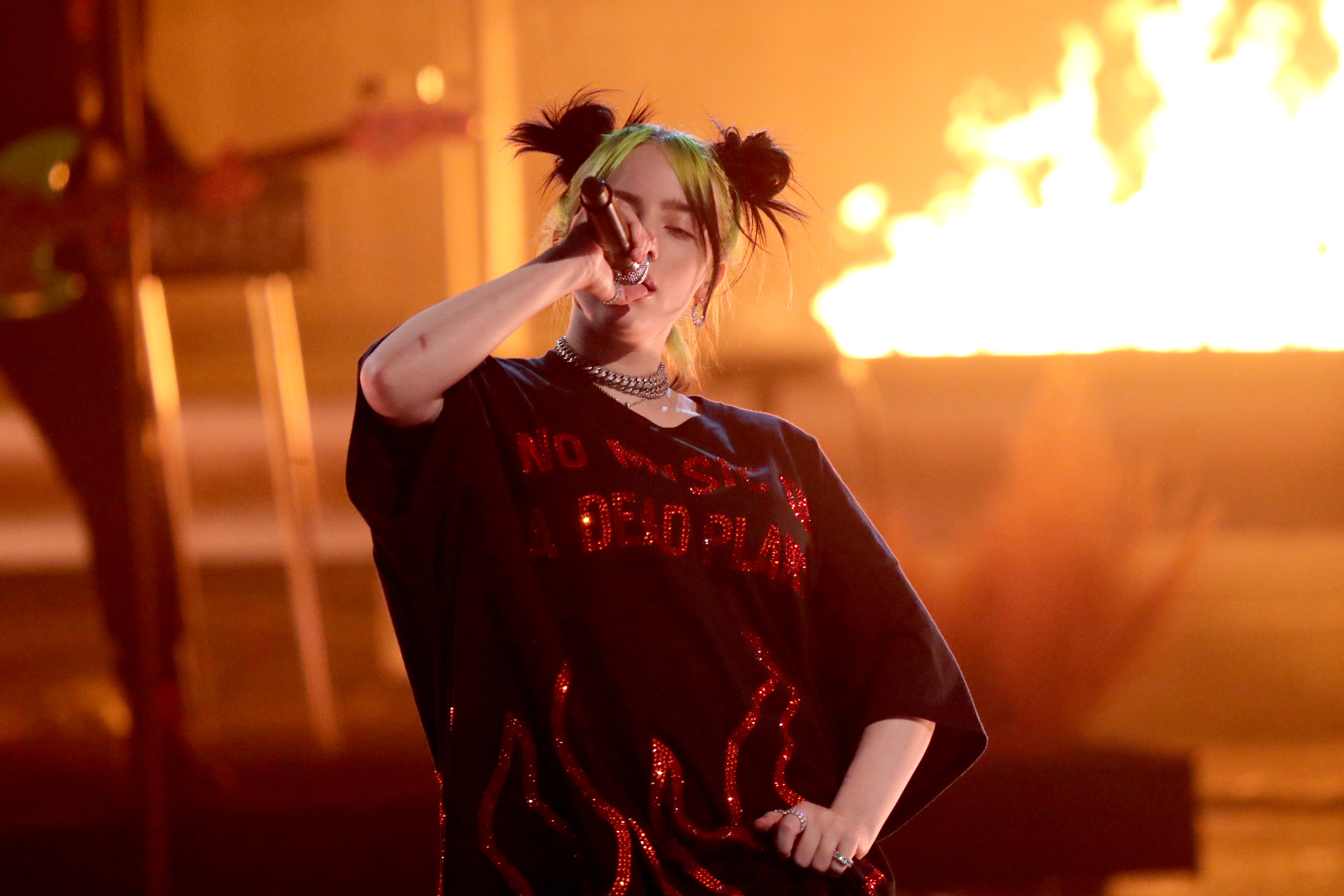Yesterday, the internet—or at least the corner of it I tend to hang out in—briefly lost its mind over a 17-year-old pop star’s comments about a 47-year-old rock band. In an appearance on Jimmy Kimmel Live from late November, Billie Eilish had answered Kimmel’s question, “Can you name any Van Halens?” by asking him, “Who?”
The moment passed without incident in the original interview, but suddenly, 11 days later, it was all anyone could talk about. Takes about Eilish and Van Halen filled my Twitter feed for a good part of the day, then bled into a group text with several close friends in the evening. An actual Van Halen weighed in, and CNN’s website published an article: “Eddie Van Halen’s son defends Billie Eilish not knowing his dad’s band.” Many other websites did the same. Hosts of at least one TV program traded jokes about it on the air.
The premise of most discussion was that a mob of Van Halen fans had mocked and attacked Eilish online for her ignorance of the ‘70s-’80s rock hitmakers. Without exaggeration, I believe that every single opinion I encountered on the matter expressed a reasonable counterargument to the haters: that Eilish deserves empathy as a teenager living out her adolescence in public, that people who criticized her were actually mad about their own irreversible aging, that no one would have expected a 17-year-old Eddie Van Halen to know every single act that was popular in 1931. Nearly all of the media coverage slanted this way (“So many angry boomers on Twitter these days!”), as did nearly all of the most popular tweets. It should go without saying that this opinion is the correct one: anyone who’s seriously mad at Eilish for not knowing Van Halen is probably an insufferable blowhard.
But is anyone seriously mad? If there is an angry boomer mob, I’m having trouble finding it. They’re not at Rolling Stone, perhaps the world’s most prominent organ for classic rock boosterism, whose article included the line “In Eilish’s defense, Van Halen have been largely inactive since she entered her teen years.” They’re not even at Fox News, angry boomer central, whose coverage was sympathetic to Eilish, and even added some favorable context that had been lost in the chatter: in the original interview, she’d given enthusiastic affirmatives when asked about other icons of previous generations whose music is more obviously similar to her own, like Madonna and Cyndi Lauper. Like CNN’s, Fox’s coverage focused on Wolfgang Van Halen’s “defense” of Eilish for not knowing his dad’s music. What was he defending her against?
The closest thing I can find to patient zero—the viral anti-Eilish take that sparked the pro-Eilish backlash—is a clip of the Kimmel video captioned “Billie Eilish didn’t know who Van Halen was, I’m sobbing,” which was tweeted last week by someone going by @_kenziepuff, whose magnificent Twitter bio identifies her as “Wife. 70s/80s rock enthusiast. Cosplayer. Anarcho-capitalist.” As the video racked up a few thousand retweets, @_kenziepuff followed it with more thoughts, including “People think I actually cried at a Jimmy Kimmel interview. Twitter is wild,” and “11k likes huh? It’s going to be awkward when people find out Van Halen isn’t even in my top 5 bands from that era and I listen to Billie.” Damon Johnson, a guitarist who currently plays in Thin Lizzy, published a lighthearted and ostensibly anti-Eilish tweet early yesterday morning (“Get off my lawn!”) that seemed to have a role in bringing the discourse from simmer to full boil. He soon hedged similarly: “And rest assured that with an 11 year old daughter here, Billie Eilish is on heavy rotation at the Johnson house. Just sucks to be reminded that I’m old af.”
The Eilish brouhaha seems to me like a particularly vivid example of an increasingly familiar phenomenon: a supposedly popular opinion or trend emerges from the internet like a phantom, visible only as negative space within the outline of people who have assembled to denounce it. This week, the internet also expressed its collective bafflement at “perineum sunning,” apparently the new rage in the holistic wellness community, which involves exposing one’s “taint” area to sunlight for a dubious array of health benefits, and whose popularity seems to extend no further than a single woman’s Instagram feed. (Josh Brolin says he tried it. I’ll believe it when I see the burns on his butthole.) In the case of Eilish, I’d venture to guess that the scattered critical tweets prompted such an eruption (pun intended) because they fell along timely and easily identifiable fault lines, coming as they did during the autumn of “OK Boomer,” boosted by social media’s apparent bias toward ideas that encourage us to split into warring armies. Never mind whether the enemy actually exists.
The weirdest and most vaguely unsettling aspect, for me, is the fact that the wave came nearly two weeks after the Kimmel video was first published, a full micro-era in internet time. It seemed to emerge almost entirely unprompted by anything real, driven only by the whims of the algorithm and the social media hive mind. One take begat another and another. Once the wave gathered enough momentum, there was no stopping it for a while. This became the topic of discussion for the day: talk about anything else and risk being ignored. Plenty of people spoke, but few seemed to care very much about what they were saying. Some chimed in even as they expressed exasperation with the discourse and their own participation in it.
The whole thing reminded me of a recent New Yorker profile of Roger McNamee, an apostate Silicon Valley venture capitalist who went from giving Mark Zuckerberg large sums of money to loudly and relentless criticizing him for the deleterious effects of Facebook on democracy and the world in general. McNamee is particularly concerned with what he and fellow critics call “behavioral modification.” This is the idea that social media platforms, in their efforts to capture, maintain, and monetize our attention, push us toward increasingly outrageous and divisive content, primed by knowledge of our preexisting biases gleaned from our previous use of the platform itself. When we see enough of this content, the thinking goes, it begins to function less like a reflection of our thoughts about the world around us and more like a driver of those thoughts, influencing us toward more extreme behavior even after we leave the social media sandbox. Eventually, we vote for Donald Trump, or become mad about Billie Eilish.
The jury is still out on whether this dynamic can swing an election, like McNamee and plenty of other smart people fear it can. At the very least, it seems it can determine the topic of petty pop cultural discussion for a day, which can drive headlines from hungry publications, which rely on the same social media platforms that gutted their readerships for the trickle of traffic that keeps them alive until tomorrow, ready to chase the next trending topic. If the internet really did convince people to vote a wannabe dictator into power, it did so with a prolonged and relentless effort, and a lot of help from campaign strategists and ad buyers and mischievous teens in Macedonia. This Eilish thing seems more like a momentary glitch, a quick and surreal blowing off of steam by a machine that can move nations with enough fuel and a few nudges in the right direction. I’m unconvinced that anyone out there is actually mad about any of this, or even that anyone truly believes anyone else is mad. Who really cares about Billie Eilish and Van Halen? I know I don’t, but here I am writing. I hope you haven’t forgotten about it already.





